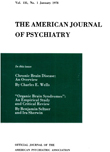PSYCHIATRIC RE-EXAMINATION OF UNSUITABLE NAVAL RECRUITS: A TWO-YEAR FOLLOW-UP
Abstract
In 1960 and 1961, of 216 recruits adjudged unsuitable by aptitude boards at two naval recruit training commands, 134 were deliberately graduated from training in order to assess their adjustment in the fleet. Two years subsequent to graduation, 97 of these sailors were still on active duty in the Navy and their over-all adjustments, evaluated on the basis of psychiatric follow-up examinations, were not demonstrably different from those of a matched control group.
It is suggested that the unexpected high rate of fleet retention among enlistees judged to be unsuitable as recruits occurred because a) many subjects were able to achieve emotional growth and maturity in the supportive and stable environment of the military, despite their pathological backgrounds; b) the fleet was able to utilize the services of some marginally performing enlistees, at least during the first several years of their enlistments; and c) initial training and adjustment problems were, for some youths, merely transitory.
Access content
To read the fulltext, please use one of the options below to sign in or purchase access.- Personal login
- Institutional Login
- Sign in via OpenAthens
- Register for access
-
Please login/register if you wish to pair your device and check access availability.
Not a subscriber?
PsychiatryOnline subscription options offer access to the DSM-5 library, books, journals, CME, and patient resources. This all-in-one virtual library provides psychiatrists and mental health professionals with key resources for diagnosis, treatment, research, and professional development.
Need more help? PsychiatryOnline Customer Service may be reached by emailing [email protected] or by calling 800-368-5777 (in the U.S.) or 703-907-7322 (outside the U.S.).



